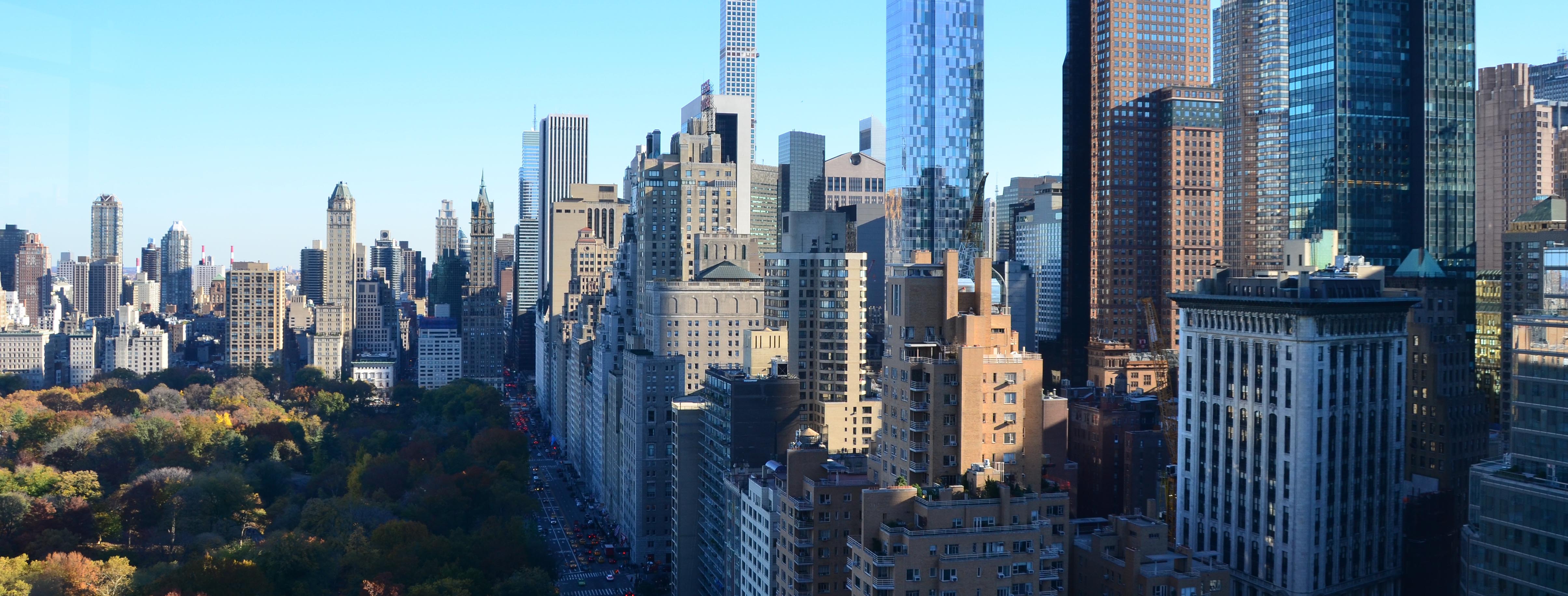The Other Parks of the Upper West Side
The Upper West Side is flanked by two glorious, spacious parks: Central and Riverside. But a number of smaller parks, a few of which would fit within a typical suburban backyard, offer green oases among the bustle and thrum.
Damrosch Park
West 62nd Street and Amsterdam Avenue
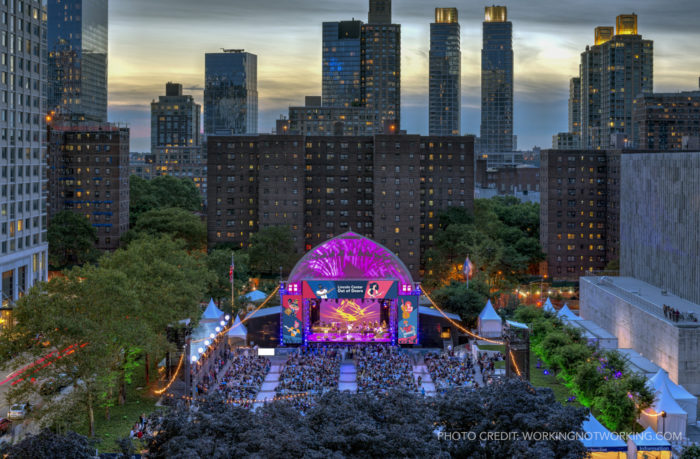
Lincoln Center Out of Doors at Damrosch Park. Image: workingnotworking.com
Part of the Lincoln Center campus, Damrosch Park is best known for the Daniel and Florence Guggenheim Bandshell. Free concerts are held here throughout the summer as part of Lincoln Center Out of Doors, and it is also the site of the annual Midsummer Night Swing fest and other events. Even when there is no concert or fair going on, the 2.4-acre park is a great place to meet up with friends or enjoy some me time. Its grid of garden beds, surrounded by low walls that serve as benches, complements the overall geometry of the campus. Located just west of the David H. Koch Theater, the park is named after the Damrosch family of musicians and conductors. Among the notable members were Leopold Damrosch, who was general manager and chief conductor of the Metropolitan Opera from 1884 until his death the following year, and his son Frank, who founded the school that later became Juilliard.
Dante Park
Between Broadway and Columbus Avenue at West 63rd Street
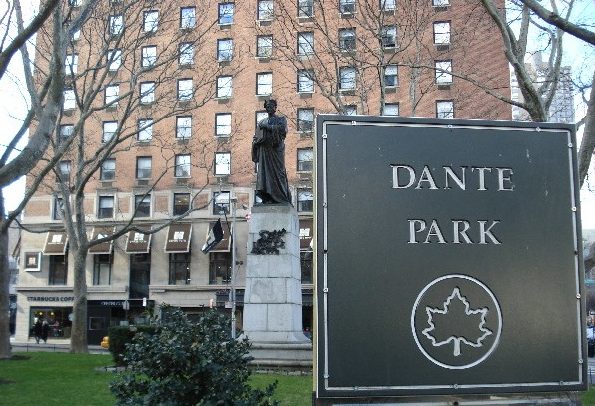
Dante Park. Image: Waymark
This 0.14-acre triangular scrap of land sits directly across from Lincoln Center. Despite its diminutive size, it is home to two significant sculptures: a bronze statue of the park’s namesake, “Divine Comedy” poet Dante Alighieri, and “TimeSculpture” by architect Philip Johnson, which has four clocks embedded on its three faces.
Richard Tucker Park
Between Columbus Avenue and Broadway at West 66th Street
Adjacent to Lincoln Center and across from Dante Park is the even smaller Richard Tucker Park. This plaza was named after a cantor-turned-opera singer, who performed with the Metropolitan Opera for 30 years until his death in 1975. A bronze bust of Tucker sits in the park amid a few trees, potted shrubs, and bistro tables and chairs. A farmers’ market is held hereon Thursdays and Saturdays year-round, as are occasional free lunchtime concerts in the summer.
Sherman Square
West 70th Street between Broadway and Amsterdam Avenue
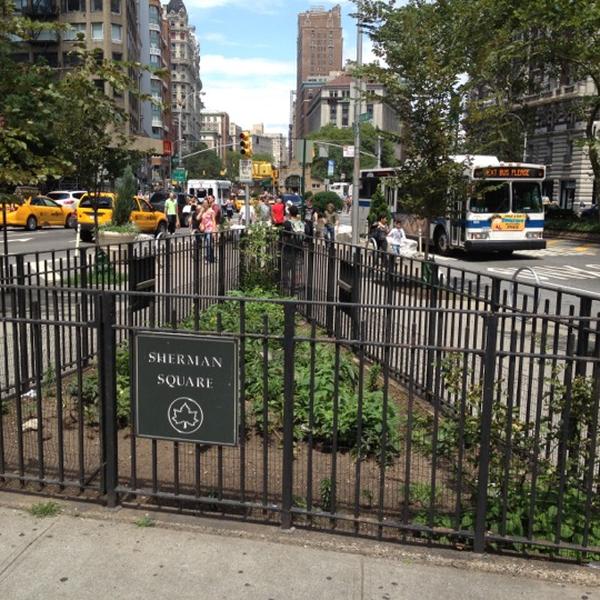
Sherman Square. Image: johnrieber
Were it not for the sign and the gate surrounding the rose garden, you would probably not suspect that this triangular patch was technically a park. It is named after Civil War general William Tecumseh Sherman, who is credited with the axiom “War is hell.”
Verdi Square
Between 72nd and 73rd Streets, Amsterdam Avenue and Broadway
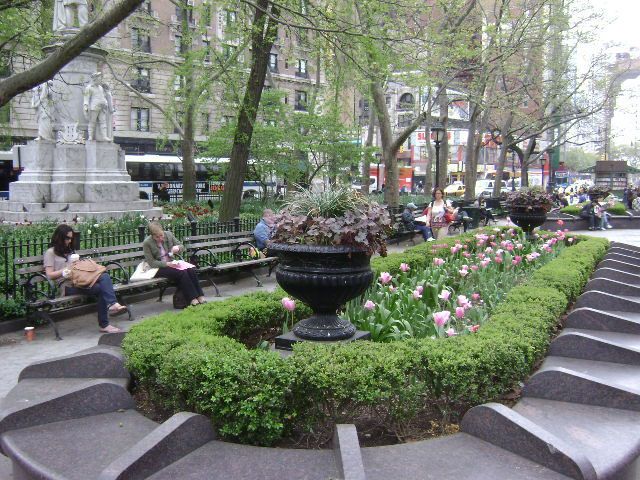
Verdi Square. Image: NYC Parks & Recreation
A stone’s throw from Sherman Square is this somewhat larger and more regal triangular park. In the center is a statue made of Carrara marble and limestone that depicts composer Giuseppe Verdi surrounded by Aida, Otello, and two other characters from his operas. Another notable structure is the Beaux-Arts head house—the above-ground entrance—to the 72nd Street subway station.
Septuagesimo Uno Park
West 71st Street, between Amsterdam and West End Avenues
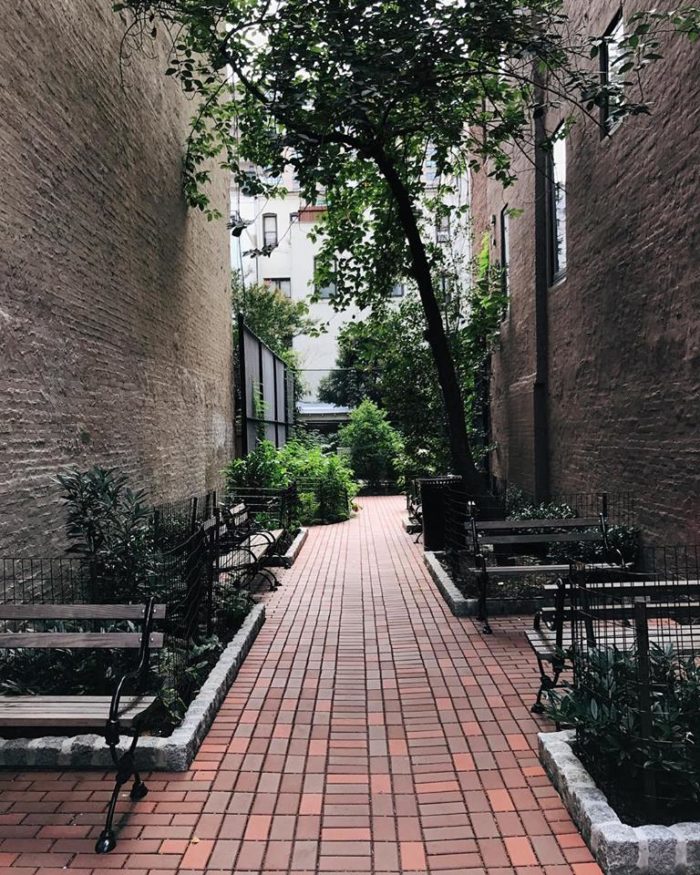
Septuagesimo Uno Park is easy to overlook. Image: Urbanist/FB
Despite its grandiose name, Septuagesimo Uno Park is little more than a leafy, charming alley between brownstones that is dotted with a half-dozen benches ideal for sitting down with a good book on a sunny day. The city acquired the unused parcel of land in the 1960s as part of Mayor John Lindsay’s Vest Pocket Park campaign to add greenery to urban neighborhoods. “Septuagesimo Uno” is Latin for “71st”; prior to gaining this name in 2000, the park was called the less romantic “71st Street Plot.”
Theodore Roosevelt Park
77th to 81st Streets, between Central Park West and Columbus Avenue
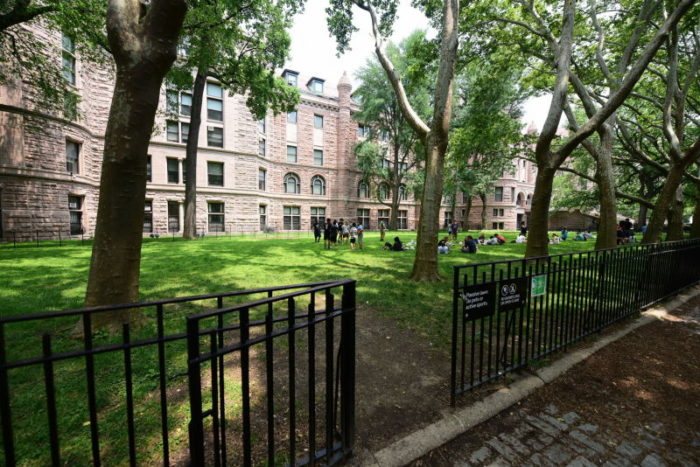
Theodore Roosevelt Park encompasses the American Museum of Natural History. Image: NYC Parks & Recreation
The American Museum of Natural History sits within the nearly 18-acre Theodore Roosevelt Park, named after the one-time New York City police commissioner, New York State governor, U.S. president, and winner of the Nobel Peace Prize. As a conservationist, he established the U.S. Forest Service and five national parks, helping to protect 230 acres of public land. Somewhat paradoxically he was also a hunter, and many of the animals he killed and preserved formed the basis of the museum’s initial collection, so it made sense to name the park after him. Even today, however, many still call it Dinosaur Park or Museum Park. Surrounding the museum are broad walking paths, lawns, benches, and numerous trees, shrubs, and flowers. On the Columbus Avenue side is the Nobel Monument, inscribed with the names of American laureates. The addition of the Richard Gilder Center for Science, Education, and Innovation to the museum, currently under way, will encroach upon about a quarter-acre of existing parkland.
Straus Park
Between 106th and 107th Streets, Broadway and West End Avenue
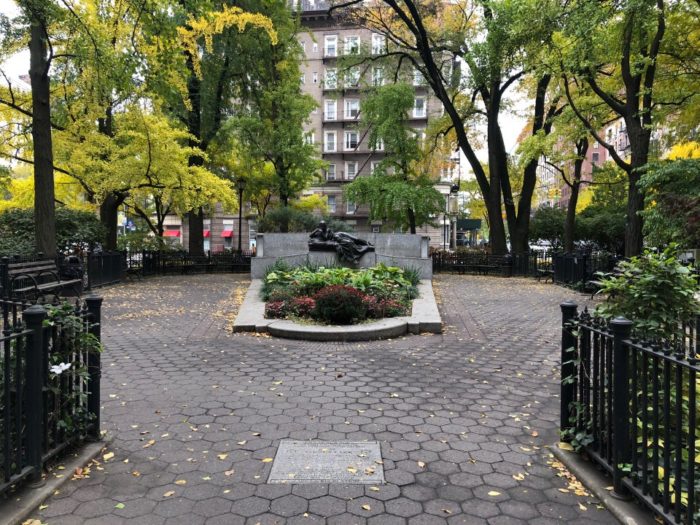
Straus Park. Image: Mike D./foursquare
Isador Straus was a man of many accomplishments, having co-owned Macy’s and served as a U.S. congressman. But today he is probably best remembered for dying on the “Titanic” with his wife, Ida; she refused to leave Isador, and he refused to take a seat on a lifeboat when there were still other women and children to be rescued. The Strauses had lived on Broadway near 105th Street, and in 1915, three years after the sinking of the “Titanic,” the park formerly known as Schuyler Square and Bloomingdale Square was renamed in their honor. Added to the park at this time was a bronze statue of a nymph looking into a reflecting pool that has since been transformed into a flower bed. Inscribed below the statue is an apt quotation from the Old Testament, “Lovely and pleasant were they in their lives and in death they were not parted.”


